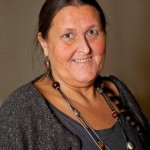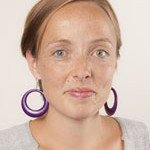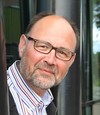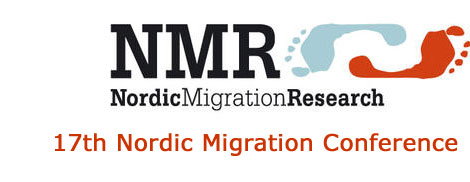IMER Bergen 15 year anniversary conference and phd course
En overraskende forskningsferd Yngve Lithman har opplevd både trams, trassel og larmerier av alle slag som leder for IMER gjennom 12 år. Men mest av alt har det vært en intellektuelt overraskende reise. I dag fyller migrasjonssatsingen 15 år. (Intervju med Yngve G. Lithaman i anledning IMER Bergens 15 års jubileum)
De nye jødene Elisabeth Eide tror ikke på at historien gjentar seg selv, men ser likevel mange likhetstrekk mellom 1940-tallet og i dag. Forskjellen er at muslimene er de nye jødene. (Intervju med Elisabeth Eide i anledning IMER Bergens jubileumskonferanse)
Misplaced women On Tuesday November 8 from 13:40 I performed my “Misplaced Women?” at arrivals & departures terminal of Bergen international airport. In approximately 30 minutes time I took out the entire contents of my two suitcases, out of my handbag as well as out of my cosmetics and make-up bags. (Read more and see the photos from the performances in Bergen previous to Tanja Ostojic’s performance lecture at Gallery 3,14)
***********************
International migration and attendant processes of globalization, both as social phenomena and in efforts at theorization, have become especially critical for the development of social theory and analysis, notably by challenging some of the fundamental questions of the social sciences. If one wishes, as Georg Simmel did, to answer the question “How is society possible?”, one cannot take for granted that the relevant object is defined within the parameters of the nationstate, nor by those of ´ethnic groups´ or ´cultures´.
In a recent evaluation report on Norwegian sociology research, it is stated that ´[t]he key question to be explored by sociology today is not, perhaps, how society is possible, but rather how to study social processes and changes at local, national and global levels (Sociological research in Norway: An evaluation, p. 17). Across the social science disciplines, it now seems impossible to imagine place, society and culture without the mobilities of people, goods and information – thus recasting questions exploring e.g. social stratification, scale, space, media and politics.
In its 15 years of existence, IMER Bergen has directed its collaborative efforts towards examining, but also reframing the fundamental questions of the social sciences, as variously defined within particular disciplines. To celebrate this 15th anniversary, we want to put to the forth the contributions that IMER research in Bergen, but also in the wider international scholarly community, has made to the study of society in general, processes of social change and new social formations in particular.
A combination of international and local scholars will in the course of a two day seminar, discuss how IMER researchers deal with issues such as migration, globalization and transnational movements – how they examine ‘culture’, ´politics´, ´space´, ´gender´, ´media´, ´government´ and ´law´ – through the prism of International Migration and Ethnic Relations.
A commitment to provide a strong and creative scholarly environment for students and research recruits has been one of IMER Bergen´s main vocations. In this spirit, the 15th anniversary comprises a PhD course for candidates within the humanities and social sciences. In addition to the main conference, the course component of the conference will be constituted by workshop sessions with essay presentations.
Programme
Wednesday 9 November Anniversary conference. OPEN LECTURE:
Venue: ‘Egget’, Parkveien 1: 10.15-10.30: Official opening with Dean of the Faculty of Social Sciences, Knut Helland, and Director of the Uni Rokkan Centre, Jan Erik Askildsen. 10.30-12.00: • DAVID LEY (University of British Columbia): “Masters of Space, or Prisoners of Space? Locating the Neoliberal Migrant” • YNGVE G. LITHMAN (University of Bergen): ”De-Etatizing Social Science?: “Verstehen” and “Erklärung” in a (somewhat) Flatter Earth”
Chair: Edvard Hviding (Department of Social Anthropology, University of Bergen)
12.15-13.15: Lunch.
Venue: Auditorium, Bergen Resource Centre, Jekteviksbakken 31: 13.15-14.45: • HAKAN G. SICAKKAN (University of Bergen): “The Politics of Diversity, the European Publics, and the European Public Sphere”
• METTE ANDERSSON (University of Bergen): “‘Reflexive Transnationalization’ among Politically Engaged Minority Youth” [Read interview with Mette Andersson in På Høyden 7 November]
Chair: Susanne Bygnes (Department of Sociology, University of Bergen)
14.45-15.00: Coffee break.
15.00-16.30:
• RANDI GRESSGÅRD (University of Bergen): “Equality Equals Hierarchy – the Holistic Foundation of Liberal Ideology and Integration Policy” • BRUCE KAPFERER (University of Bergen): ”The Tamil Crisis: State, War and Peace in Sri Lanka and Shifts in Global Power”
Chair: Kathinka Frøystad (Department of Social Anthropology, University of Bergen)
Thursday 10 November Anniversary Conference. Venue: Auditorium, Bergen Resource Centre, Jekteviksbakken 31:
10.15-11.45:
• CHRISTINE M. JACOBSEN (Uni Research and University of Bergen): “The (not so) New Islamic Presence in Western Europe: Secular Governance and Religious Freedom in a Globalized Era” • ANDRÉ ITEANU (Centre National de la Recherche Scientifique (C.N.R.S.), Paris): “The Free Noble and the Poor Beggar. What does the Veil Controversy Reveal about French Ideology”
Chair: Synnøve Bendixsen (IMER Bergen and Uni Rokkan Centre)
12.00-13.00: Lunch.
13.00-14.30: • SUSI MERET (University of Aalborg): “Exploring the Social, Political and Cultural Challenges of Right Wing Populism in the Nordic Countries: Comparative Approaches, Developments and Perspectives”
• ELISABETH EIDE (Oslo University College and University of Bergen): “Media Discourses, Migration and Post-22.7-Debates; a Critical Inquiry”
Chair: Elisabeth Ivarsflaten (Department of Comparative Politics, University of Bergen)
14.30-14.45: Coffee break.
14.45-16.30: PANEL DISCUSSION: “The Future of IMER Research”
David Ley (University of British Columbia) Susi Meret (University of Aalborg) Hilde Lidén (Nordic Migration Research and Institute for Social Research, Oslo) Yngve G. Lithman (IMER Bergen and University of Bergen) Mette Andersson (IMER Bergen and University of Bergen) Hakan G. Sicakkan (IMER Bergen and University of Bergen)
Chair: Yngve G. Lithman (IMER Bergen and Department of Sociology, University of Bergen)
* * *
19:00: Performance lecture by artist TANJA OSTOJIC: “Crossing Borders“. Venue: Galleri 3,14. Vågsallmenningen 12. Free entrance. Refreshments will be served. In addition, her project “Misplaced Women? Marking the City” is a series of performances, interventions and delegated performances which will take place in the public space of Bergen previous to the lecture. In collaboration with the International Contemporary Art Foundation 3,14. Friday 11 November PhD course. PhD candidates, please see the Course Site for more information.
Venue: Seminar room, Uni Rokkan Centre, Nygårdsgt. 5, 6th floor. 10:15-16:30: Essay presentations. Conference fee: Nok 500,- for two days (includes lunch) Students: Nok 300,- REGISTRATION to Hanna Skartveit. Still possible to register!
The Conference is organised in collaboration with Uni Rokkan Centre, Dept. of Social Anthropology, Dept. of Sociology, Dept. of Geography, Dept. of Comparative Politics and SKOK, University of Bergen.
In June 2012 the University of Bergen will organise a PhD conference on BSRS-related themes. The title of the conference is Transnational migration and global development.
«Mobilitet, moral og migrasjon: familisme – begrepet i norske og italienske kontekster.»
Seminaret tar for seg hvordan middelhavslandenes familisme – begrep konstrueres og erfares i migrasjons-kontekster blant nordmenn i Italia og italienere i Norge. Dagens familisme utfordres både av «post-moderne” endringer i familie-strukturen, slik som lav fertilitet og stigende skilsmisse-rater, og av finanskrise og migrasjon.I Sør-Europa eksisterer lav fertilitet side om side med tradisjonelle omsorgs-organiseringer og parallelt med kontant-tunge velferdsprogrammer og begrenset produksjon av tjenester for de unge og de eldre. Den sentrale oppfatningen i komparative studier av relasjonen mellom familie og velferd er at velferdsstatene baserer politikken på en «tatt-for-gitt» holdning til en kjønnstradisjonell familie-institusjon, og denne kulturelle forutsetningen sementerer de tradisjonelle familie-strukturene. Men i hvilken grad er familiestrukturer og kulturelle og sosiale normer og verdier bundet sammen med idealtypiske regimer og nye migrasjonsmønstre?Nyere forskning viser til at sør-europeiske kvinner drømmer om den nordiske velferdsstaten eller en stat som organiserer familie -og arbeidsbalansen bedre. De vil ha tilgang på flere og bedre offentlige omsorgstjenester. Nordiske velferdsstater framstår som reneste paradiser for kvinner i Italia, og definitivt som et ideal, hevder samfunnsforskere. På den andre siden ser vi at mens italienere drømmer om velferd og arbeid, drømmer nordmenn om mer familieliv. En av de norske informantene i mitt prosjekt sier at hennes drøm er «å få til et italiensk familieliv kombinert med et norsk arbeidsliv». Hvordan er forbindelsen mellom familie-strukturer og familie-verdier? Hvordan er de relatert til mobilitet, moral og migrasjon?
 Lise Widding Isaksen er professor i sosiologi på Universitetet i Bergen. Hun jobber for tiden med prosjektene 1) «Mobilitet, moral og migrasjon: en studie av familiekulturer i Norge og Italia» , 2) «Polish Female Migrants and Their Families: A Study of Care Deficits» og 3) «Welfare Models, Demographic Patterns and Family Strategies in the Context of the Financial Crisis in Spain»
Lise Widding Isaksen er professor i sosiologi på Universitetet i Bergen. Hun jobber for tiden med prosjektene 1) «Mobilitet, moral og migrasjon: en studie av familiekulturer i Norge og Italia» , 2) «Polish Female Migrants and Their Families: A Study of Care Deficits» og 3) «Welfare Models, Demographic Patterns and Family Strategies in the Context of the Financial Crisis in Spain»
Siste publikasjoner:
Lise Widding Isaksen, 2010 (ed): Global Care Work. Gender and Migration in Nordic Societies. Nordic Academic Press, Lund, Sverige
Lise Widding Isaksen (2012) “Transnational Spaces of Care: Migrant Nurses in Norway.” In Social Politics, International Studies in Gender, State and Society, vol. 19, number 1, spring 2012, p.58-78, Oxford University Press, Oxford
“Children Left Behind” i samarbeid med Uma Devi og Arlie R. Hochschild i Hochschild, Arlie R., 2013: «So How’s the Family» and other essays», University of California Press, Berkeley
Communicating Migration Seminar Series IMER Bergen spring and autumn 2014
The IMER seminar series for 2014 will cover how migration and ethnic relations are communicated in every-day encounters, in mass and social media, in politics and in teaching at the universities. Has the way people talk about migration and migrants in different social contexts changed over time, and in which ways has it changed? How does migration theory and research fit in with other topics and theories in the social sciences, and how do results from migration research inform public debate and policy development? Communicating migration will be discussed from various angles in our seminar series on international migration and ethnic relations during spring and autumn 2014. We welcome papers that touch upon this broad theme from different angles. Historical analyses of change over time in regard to politics and public debate, research foci and disciplinary concerns are specifically welcomed. The seminar series will end with a two-day conference in October/November 2014.
The Children of the Revolution: Reflections on Chinese London and how to Theorise these New Forms of Migration
This paper explores some of the London data from a three-city investigation of migration. The other two cities are Beijing and Hong Kong, and in each city we are exploring young (23-39) graduate migrants from the other two cities in order to understand how global mobility features in young professionals’ life and career planning. Little has been written about UK migrants in Hong Kong and Beijing, and the existing literature on Chinese migrants in London is centred on long-term (often depicted as poor and illegal) migrants from Hong Kong. Such studies do not begin to capture the lives of the new young migrants, many of whom are from Mainland Chinese cities, who must navigate new border restrictions favouring the wealthy and the highly talented. The paper will explore some of the challenges to existing migration theory these young urban migrants pose.
Caroline Knowles
 Caroline Knowles is Professor of Sociology and former director of the Centre for Urban and Community Research (CUCR) at Goldsmiths, University of London. She is known for her work with artists and photographers exploring the intersections between art and sociology in urban social research. Following her interest in materials and translocality she has just completed the biography of a pair of flip-flop sandals funded by the Leverhulme Trust with Singapore artist Michael Tan. Flip-Flop: A Journey Through Globalisation’s Backroads will be published in May by Pluto Press. Following her interests in migration she is also currently researching the Beijing, London, Hong Kong circuit travelled by young migrants in these three cities in collaboration with Ho Wing Chung at the City University of Hong Kong. She is the author of many books and papers on cities, ethnicity, migration and mobilities including Hong Kong: Migrant Lives, Landscapes and Journeys (2009) University of Chicago Press with US photographer and Sociologist Douglas Harper.
Caroline Knowles is Professor of Sociology and former director of the Centre for Urban and Community Research (CUCR) at Goldsmiths, University of London. She is known for her work with artists and photographers exploring the intersections between art and sociology in urban social research. Following her interest in materials and translocality she has just completed the biography of a pair of flip-flop sandals funded by the Leverhulme Trust with Singapore artist Michael Tan. Flip-Flop: A Journey Through Globalisation’s Backroads will be published in May by Pluto Press. Following her interests in migration she is also currently researching the Beijing, London, Hong Kong circuit travelled by young migrants in these three cities in collaboration with Ho Wing Chung at the City University of Hong Kong. She is the author of many books and papers on cities, ethnicity, migration and mobilities including Hong Kong: Migrant Lives, Landscapes and Journeys (2009) University of Chicago Press with US photographer and Sociologist Douglas Harper.
Communicating Migration Seminar Series IMER Bergen spring and autumn 2014
The IMER seminar series for 2014 will cover how migration and ethnic relations are communicated in every-day encounters, in mass and social media, in politics and in teaching at the universities. Has the way people talk about migration and migrants in different social contexts changed over time, and in which ways has it changed? How does migration theory and research fit in with other topics and theories in the social sciences, and how do results from migration research inform public debate and policy development? Communicating migration will be discussed from various angles in our seminar series on international migration and ethnic relations during spring and autumn 2014. We welcome papers that touch upon this broad theme from different angles. Historical analyses of change over time in regard to politics and public debate, research foci and disciplinary concerns are specifically welcomed. The seminar series will end with a two-day conference in October/November 2014.
Ida Tolgensbakk – Swedish migrants in Norwegian media and popular culture
In this seminar Ida Tolgensbakk will present some findings from her PhD research on young, Swedish labor migrants in Oslo. In everyday encounters in Norway, the young Swedes are identified as such primarily through linguistic characteristics, and not for instance skin color, phenotype, or dress. That is, they are audible rather than visible migrants. Tolgensbakk will discuss what kind of consequences this has on the lives of the young Swedes, as well as look into the related questions of how the young Swedes are presented in Norwegian media and popular culture.
Ida Tolgensbakk
Department of cultural studies and oriental languages, UiO. Ida Tolgensbakk has a master in folklore studies from 2005 (on national identity in the Faroe Islands). She worked three years at the Norwegian Institute of Local history, mainly focusing on migrant’s life stories. She is now studying young, Swedish labor migrants moving to Oslo. Her research is based on life story interviews, fieldwork on a Facebook group, and texts from popular culture and the media.
Read more here: http://www.hf.uio.no/ikos/english/people/aca/idatol/
Communicating Migration Seminar Series IMER Bergen spring and autumn 2014
The IMER seminar series for 2014 will cover how migration and ethnic relations are communicated in every-day encounters, in mass and social media, in politics and in teaching at the universities. Has the way people talk about migration and migrants in different social contexts changed over time, and in which ways has it changed? How does migration theory and research fit in with other topics and theories in the social sciences, and how do results from migration research inform public debate and policy development? Communicating migration will be discussed from various angles in our seminar series on international migration and ethnic relations during spring and autumn 2014. We welcome papers that touch upon this broad theme from different angles. Historical analyses of change over time in regard to politics and public debate, research foci and disciplinary concerns are specifically welcomed. The seminar series will end with a two-day conference in October/November 2014.
Closing conference PROVIR
“Exceptional welfare: Dilemmas in/of irregular migration”
How do states respond to the physical presence and needs of people it officially has excluded? To what extent do international human rights provide protection? How does migration control and welfare policy affect irregular migrants’ experiences and subjectivities?
Physically present, but legally excluded, irregular migrants’ present societies with particular dilemmas relating to both sovereignty and human suffering. European countries increasingly involve welfare services in migration control, either by restricting access, or by using welfare services to detect/expose irregular migrants. This raises important questions concerning not only how migrants’ legal status influences their capacity to access services, but also the practical and ethical implications for service providers. Furthermore, it challenges the extent to which human rights actually limit the exclusionary powers of states and as such whether human rights are viable outside the confines of citizenship.
Provision of Welfare to Irregular Migrants (PROVIR) will be organizing its closing conference at the University of Bergen, 19th – 21th of November 2014. As an interdisciplinary project, the PROVIR research group and its international partners have combined a legal and social science approach to the provision of welfare to ‘irregular migrants’ in Norway, and comparatively in Europe, looking particularly at health care and education. The aim of the project has been to investigate the complex relationship between law, institutional practice, and migrants’ lived experience.
The closing conference aims to bring together researchers from various disciplines who are interested in the interplay between migration control and welfare policy. At the conference, findings from the PROVIR-project will be presented by the research team. In addition to presentations by key note speakers, the PROVIR research team also welcomes papers to be presented at workshops. We especially invite contributions addressing:
1) Irregular migrants’ legal situation regarding access to welfare provisions, either in national or international law.
2) Institutional practices and responses by service providers.
3) Migrants’ experiences, agency and embodiment.
We welcome both theoretical and empirical ventures into these questions, and papers may combine the aforementioned issues with interdisciplinary approaches. We particularly encourage papers exploring issues related to health, education and children. Paper proposals (maximum 300 words) can be submitted until the 25th of April 2014. Please include a short bio with the abstract. Conference registration deadline is 1st of October.
More information about the PROVIR-project is available at http://rokkan.uni.no/sites/provir/
IMER Abroad: PROVIR Seminar – Precarious migrants and access to welfare: Between policy, law and practice
This workshop will discuss the legal and experienced dilemmas found in the encounter between migrants living in a legally precarious situation and the welfare state in which they reside. Participants will present ongoing empirically based research on migrants’ access to welfare in policy, law and practice in various European countries. They will also discuss the particular position of youth and children in vulnerable situations. The program is available here.
Lessons from the past: framing post-war immigration in Germany by historical analogies
In many West European countries, the experience of mass immigration after 1945 was perceived as something basically new and unprecedented. In the lengthy process of coming to terms with the new situation and of developing a self-understanding as countries of immigration and of ethnic pluralism, historical arguments often played an important role. By placing present-day immigration into a historical perspective, by constructing narratives of continuity (and discontinuity) and not least by presenting persuasive historical analogies, historians (and others) introduced arguments that informed the debates of the day and allowed the experiences of immigration and multi-ethnicity to be integrated into (national) narratives of identity. The German case is particularly interesting in this respect, since a tradition of tolerance and successful integration had to be invented in spite of the fresh memories of the Nazi-past that were witness to the contrary.
 Christhard Hoffmann (born 1952 in Luneburg, Germany) is a German historian and professor of modern European history at the University of Bergen. In the period 2007-2013 he was Head of the Department of Archaeology, History, Cultural Studies and Religion.
Christhard Hoffmann (born 1952 in Luneburg, Germany) is a German historian and professor of modern European history at the University of Bergen. In the period 2007-2013 he was Head of the Department of Archaeology, History, Cultural Studies and Religion.
Hoffmann defended in 1986 his doctoral dissertation on German Antiquity historians’ representation of Jews and Judaism in the 19th and 20th centuries [1] at the Technische Universität Berlin, where he also worked as a researcher for many years. From 1994 to 1998 he was a visiting professor at the University of California, Berkeley, and since 1998 he has worked at the University of Bergen.
Hoffmann has an extensive list of publications in the fields of German-Jewish history and cultural history, history of anti-Semitism and migration history.
Communicating Migration Seminar series
The IMER seminar series for 2014 will cover how migration and ethnic relations are communicated in every-day encounters, in mass and social media, in politics and in teaching at the universities. Has the way people talk about migration and migrants in different social contexts changed over time, and in which ways has it changed? How does migration theory and research fit in with other topics and theories in the social sciences, and how do results from migration research inform public debate and policy development?
Communicating migration will be discussed from various angles in our seminar series on international migration and ethnic relations during spring and autumn 2014. We welcome papers that touch upon this broad theme from different angles. Historical analyses of change over time in regard to politics and public debate, research foci and disciplinary concerns are specifically welcomed.
BSRS 2014 Governance to meet Global Development Challenges
Welcome to BSRS2014!
The theme for BSRS2014 is Governance to meet Global Development Challenges. The event will take place from June 23rd to July 4th 2014 at the University of Bergen. Please find information about the courses, application form and other activities at the menu to your right side.
One of the courses is and IMER/SKOK PhD course.
Read more at:
http://www.uib.no/rs/bsrs/programme/bsrs-2014-governance-to-meet-global-development-challenges
The 17th Nordic Migration Conference is organized by a steering committee consisting of researchers from Aalborg University, Copenhagen University, SFI – the Danish National Centre for Social Research and Roskilde University Center, as well as board members from Nordic Migration Research.Confirmed keynote speakers:
– Professor Thomas Hylland Eriksen, Oslo University, Norway.
– Professor Nicolas de Genova, King’s College, London, UK
– Economist Philippe Legrain, London School of Economics, UK
– Professor Claudia Strauss, Pitzner College, USA.Time and place
The conference will be held in Denmark – 13th – 15th August – 2014, and hosted by Centre for Advanced Migration Studies at the University of Copenhagen, on Amager, close to Copenhagen Airport.- Read more at:

